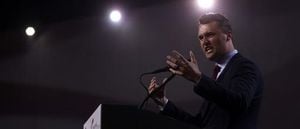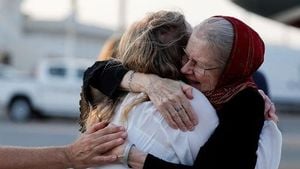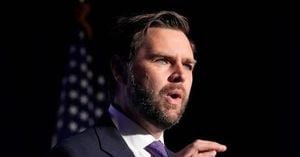White House press secretary Karoline Leavitt took center stage this week with a fiery tirade against the media, defending President Trump’s approach to the Russia-Ukraine conflict and igniting a fresh debate over the administration’s foreign policy claims. The episode, which unfolded during a press briefing on August 19, 2025, and reverberated through political commentary and podcasts in the days that followed, has laid bare the deep divisions over both the substance and the spin surrounding U.S. diplomacy in Eastern Europe.
The controversy began in earnest when Leavitt, 27, opened her regular White House briefing with a pointed rebuke of journalists’ coverage of Trump’s recent summit with Russian President Vladimir Putin in Alaska. According to The New Republic, Leavitt accused “much of the left-wing media” of “actively rooting against the president of the United States in the pursuit of peace.” She charged that pundits and foreign policy experts—whose “record is nothing but endless wars, trillions of wasted taxpayer dollars, and dead Americans”—had “the nerve to try and lecture President Trump, who has solved seven global conflicts in seven months, about peace.”
Leavitt’s remarks were met with enthusiastic support from Vice President JD Vance, who took to X (formerly Twitter) to praise her performance. “Karoline Leavitt lighting the American media up for lying about our negotiations with Russia and Ukraine,” Vance wrote. Leavitt responded with gratitude via Instagram, posting, “Thank you, Mr. VP!”
The backdrop to this media clash was Trump’s high-profile meeting with Putin, which, as reported by The New Republic and corroborated by The Daily Blast podcast, ended without a ceasefire agreement. Trump, nevertheless, insisted that the summit was merely a “listening session” and a prelude to further talks—a point Leavitt echoed, framing the event as a diplomatic step rather than a missed opportunity. Critics, however, were quick to note the optics of the encounter: Putin was given a red carpet welcome, a rare ride in the presidential limousine, and public applause from Trump, sparking outrage among those wary of legitimizing the Russian leader.
Amid these theatrics, the war in Ukraine raged on. The Russian military continued its advance, Ukrainian forces resisted, and Russian bombs fell on Ukrainian cities. European nations, alarmed by the shifting U.S. posture, ramped up their support for Ukraine, compensating for what many saw as a reduction in American commitment under Trump. According to Nicholas Grossman, a professor of international relations at the University of Illinois and guest on The Daily Blast, “The United States is floundering, is looking like it is hapless as opposed to being the essential leader in the world that is trying to establish peace.”
Leavitt’s defense of Trump’s record—particularly the claim that he had “solved seven global conflicts in seven months”—became a lightning rod for criticism. Grossman dismissed the assertion as “bullshit,” likening it to a debate tactic known as the “Gish gallop,” where a barrage of dubious claims overwhelms opponents. He argued that, in reality, “Trump has escalated various conflicts, destabilized various situations and generally made the world a less stable place by weakening support for U.S. allies and abandoning America’s role in the world.”
The podcast further dissected the administration’s handling of security guarantees for Ukraine. Trump’s promises, Grossman contended, were “vague” and lacked the credibility and commitment required to deter Russian aggression. “A real security guarantee is hard,” he explained. “It takes an immense amount of effort to make it that Russia truly believes that the United States will go to war for, for example, Poland. And by that, it keeps Russia out of Poland. So to make a real security guarantee that would keep Russia out of Ukraine—given that Russia has attacked not once but twice, breaking agreements each time in doing it, it stands to reason that Putin can’t be trusted, that he could easily decide to try for more again later, which means that there would need to be real boots on the ground that would be in the way.”
Leavitt, meanwhile, insisted that the Alaska summit had produced “so much progress” that “every single one” of the European leaders “got on a plane 48 hours later and flew to the United States of America.” Grossman flatly contradicted this narrative, stating, “The Europeans scrambled to Washington in worry to try to urge the United States not to make a terrible mistake. And that is not an achievement. That is a sign of a terribly frayed alliance, of the U.S. being an unreliable partner, of chaos where there’s supposed to be this bedrock of reliability that provided security for the U.S. and its allies for so many years.”
Public opinion appears to reflect growing skepticism toward the administration’s approach. A new Reuters poll, cited on The Daily Blast, found that 54 percent of Americans believe Trump is too closely aligned with Russia—a majority that suggests the White House’s efforts to recast the president as a peacemaker have not fully succeeded. The poll’s findings are particularly notable given the “roar of propaganda” coming from the administration, as host Greg Sargent put it, and the persistent attempt to frame Trump’s relationship with Putin as one of mutual respect and strategic savvy.
Grossman offered a stark assessment of the broader implications, warning that Trump’s foreign policy is “setting us up for a world in which the alliance of Western liberal democracies is weaker and autocracies are stronger.” He described the current era as a departure from the post-World War II order, with the U.S. abdicating its traditional role as “the champion of democracy, as the policeman of the world, as the head of the liberal world order.” In his view, this shift has led to a “more dangerous, less stabilized world,” marked by frayed alliances, emboldened autocrats, and the erosion of American credibility.
As the dust settles from this latest media skirmish, one thing is clear: the battle over the narrative of American leadership—and the reality behind the rhetoric—shows no sign of abating. Whether Leavitt’s spirited defense will shore up public trust or simply deepen the partisan divide remains to be seen, but the stakes for Ukraine, for Europe, and for the world are undeniably high.





